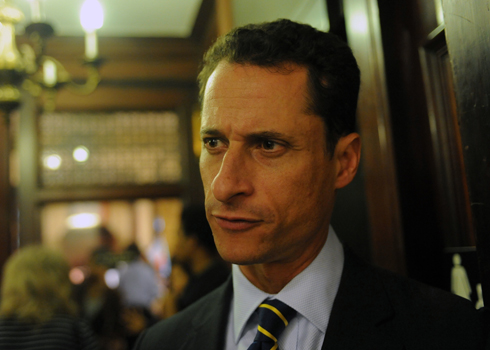Rep. Anthony Weiner (D-NY) may be in far more ethical and legal trouble than initially thought.
New information about Weiner’s use of Congressional resources to conduct extramarital online relationships — and possibly to help manage the chaotic public relations fallout since their discovery over Memorial Day weekend — is raising red flags for ethics watchdogs.
At one point after Weiner called her, one woman, Meagan Broussard, told ABC News that she called Weiner back to see if it was actually him, and an “office receptionist answered,” according to the the report. Broussard provided a record of the call to ABC News.
TMZ reported Tuesday that Weiner gave one woman, porn star Ginger Lee, detailed instructions on how to lie about their relationship and at one point offered to have someone on his professional PR “team” give her advice.
A broad ethics rule says members should not engage in activity that reflects badly on the House as an institution, but lawmakers are rarely investigated for breaking this rule alone.
But if a PR team on the Congressional payroll provided help, it could be a violation of federal law barring the use of Congressional staff and resources for personal activities, according to Melanie Sloan, executive director of Citizens for Responsibility and Ethics in Washington.
“If he required his press secretary to offer assistance to Ms. Lee, he might have a problem,” Sloan told TPM.
By using staff to perform personal errands on official time and with the use of official resources, Weiner might have violated 31 U.S. Code § 1301(a), which states that “[Congressional] appropriations shall be applied only to the objects for which the appropriations were made.”
Corresponding regulations of the Committee on House Administration provide that “[e]mployees may not be compensated from public funds to perform non-official, personal, political, or campaign activities on behalf of the Member, the employee, or anyone else.”
“Employees of the House are paid from funds of the United States Treasury to perform public duties” that expressly “do not include performing nonofficial, personal, or campaign duties,” the rule states.
Weiner, however, may have an out if he used campaign funds to pay a public relations person to deal with this, which would likely be permissible, Sloan points out.
If he used Congressional resources to conduct the relationships and provide public relations help to any one of these women, it could come down to a question of scale.
“The question is what resources were used and at what magnitude,” said longtime Congressional ethics attorney Stan Brand. “The rules recognize some level of incidental overlap between personal and official.”
Brand agreed that Weiner would be in the clear if he used campaign resources for advice on responding to the press on the allegations — even if he used them to help coach the women to lie on his behalf.
“To the extent this is reprehensible but not illegal conduct is simply irrelevant as a legal matter,” Brand said.
The legal fallout of two former senators’ efforts to cover up sex scandals hinge on alleged violations of campaign-finance law.
Sen. John Edwards (D-N.C.) was indicted Friday on allegations that the nearly $750,000 he paid Rielle Hunter to keep their extramarital relationship and child quiet during his 2008 presidential campaign amounted to illegal campaign donations because they were not disclosed to the Federal Elections Commission and exceeded the legal limits for contributions from individuals.
Meanwhile, the Senate Ethics Committee recently found ample evidence that former Sen. John Ensign (R-NV) violated campaign finance rules by having his parents pay his former mistress and husband, who were also his ex-aides, more than $90,000 in hush money. The committee forwarded its findings to the Justice Department for further investigation.
Weiner’s office did not respond to specific questions about what resources, if any, were used to coach the women involved to lie on his behalf.
“As Congressman Weiner said yesterday, he is fully cooperating with a House ethics inquiry, and that will be the appropriate place for any further questions to be addressed,” his spokesman said in an e-mail.
TPM specifically asked whether he used Congressional resources to coach a college student from Seattle who received an obscene photo from Weiner’s Twitter account and then provided a lengthy written statement to the New York Daily News the Sunday before Memorial Day backing his contention that they were both victims of online pranksters.
Weiner admitted to lying about the photo he sent the Seattle student and concocting a phony hacking story in a chaotic Monday press conference. Although he admitted to engaging in inappropriate online relationships with six women over the course of three years, he said he did nothing illegal and would not resign.






